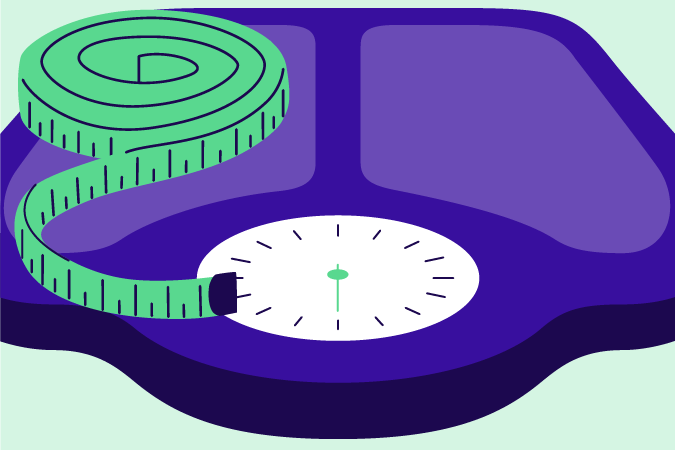Be a healthy weight
Keep your weight within the healthy range and avoid weight gain in adult life.

On this page
Overview of evidence
There is strong evidence that greater body weight* causes many cancers. Rates of overweight and obesity in both children and adults are increasing in most countries.
Goals
- Ensure that body weight during childhood and adolescence projects towards the lower end of the healthy adult BMI range
- Keep your weight as low as you can within the healthy range throughout life (BMI of 18.5–24.9)
- Avoid weight gain (measured as body weight or waist circumference) throughout adulthood
Evidence
There is convincing evidence that greater body weight in adults INCREASES the risk of cancers of:
- oesophagus (adenocarcinoma)
- pancreas
- liver
- colorectum
- breast (postmenopausal)
- kidney
- endometrium
Greater body fatness probably INCREASES the risk of cancers of the:
- mouth, pharynx and larynx
- stomach (cardia)
- gallbladder
- ovary
- prostate (advanced)
Maintaining a healthy weight throughout life is one of the most important ways to protect against cancer, but overweight and obesity (generally assessed by BMI and waist circumference) are more prevalent than ever. Globally, approximately 2 billion adults are currently living with overweight and obesity and, within this group, 800 million are living with obesity (defined as a BMI of 30 or above).
The rate of increase for overweight and obesity has begun to slow in some high-income countries. However, the prevalence of obesity has accelerated in low- and middle-income countries, in tandem with considerable changes in food systems and dietary patterns – commonly termed the ‘nutrition transition’. Overweight and obesity is also occurring at ever earlier ages, increasing lifetime exposure to the associated risks.
Key factors contributing to weight gain and obesity are increased sedentary time (including screen time), decreased physical activity, consumption of sugar sweetened drinks, fast foods and refined grains. Collectively, these factors can be considered a “Western type” diet and lifestyle.
For some cancers, the increase in risk is seen with increasing body fatness even within the so-called ‘healthy’ range, but most benefit is gained by avoiding overweight and obesity. This is particularly important for children, as overweight and obesity in childhood and early life often follows through into adulthood.
BMI is a useful measure for most adults, but because the relationship between BMI and body composition varies between racial and ethnic groups, different reference ranges have been proposed for Black and Asian populations. BMI results may be less reliable for other groups of people, including:
- athletes, and those with a lot of muscle
- older people
- pregnant women
- those less than 1.5m/5ft tall
- children and teenagers
The Recommendation can best be achieved by:
- being physically active
- eating a diet rich in wholegrains, vegetables, fruit and pulses such as beans
- limiting consumption of ‘fast foods’ and other processed foods high in fat, starches or sugars
- limiting consumption of sugar sweetened drinks.
Additional information
There is other evidence on being overweight or obese throughout adulthood that is limited (either in amount or because of issues with study design or other methodological flaws), but is suggestive of an increased risk of cervical cancer for women with a BMI of 29 kg/m2 or more. Further research is required and this limited evidence did not inform this recommendation.
A separate body of work undertaken by the International Agency for Research on Cancer (IARC) concluded that individuals living with overweight and obesity had an increased risk of 13 cancers: endometrium, oesophagus, gastric cardia, liver, kidney, multiple myeloma, meningioma, pancreas, colorectal, gallbladder, breast (post-menopausal), ovarian, and thyroid.
Mechanisms
The mechanisms underpinning links between cancer, overweight and obesity are varied and multiple common mechanisms are likely to be involved for different cancers. Body fatness is associated with chronic inflammation and insulin resistance, for example, causing increased levels of pro-inflammatory cytokines (such as TNF-alpha and IL-6) and contributing to the development of many cancers, such as liver, oesophageal, ovarian, and colorectal.
Greater body fatness is also associated with higher circulating levels of several hormones, such as oestrogens and androgens, creating an environment that promotes carcinogenesis and suppresses apoptosis and contributing to the development of breast (post menopause), endometrial, and prostate (advanced) cancers. Find out more at Mechanisms: the biology linking obesity and weight gain with cancer.
Implications for other diseases
Greater body fatness has a causal role in the development of several other disorders and diseases, such as type 2 diabetes, dyslipidaemia, hypertension, stroke and coronary heart disease, as well as digestive and musculoskeletal disorders. People with obesity often develop several of these disorders or diseases, leading to multiple comorbidities.
Public health / policy implications
Globally, the prevalence of overweight and obesity is high and is increasing in most countries. A whole-of-government, whole-of-society approach is necessary to create environments for people and communities that are conducive to being a healthy weight and consistent with our Cancer Prevention Recommendations.
A comprehensive package of policies is needed to enable people to achieve and maintain a healthy weight. Our Policy blueprint for cancer prevention and Healthy weight and cancer prevention factsheet outline all the areas where governments must take action to create a healthy environment. This includes policy areas that influence the food environment (how food is priced, marketed, sold and procured), the food system (how food is produced) and the built environment (how accessible environments are for physical activity).
Our NOURISHING and MOVING databases also contain information on the different food policies and physical activity policies that are being implemented around the world.
-
Notes
* The term ‘body weight’ is used here as a simpler term for adiposity; it includes body mass index, waist circumference, waist-to-hip ratio’
Further reading
Get more detail on this topic from different parts of our Diet and Cancer Report 2018

